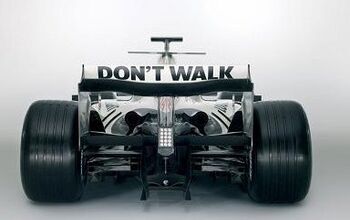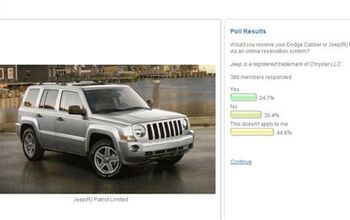Opinion: We Don't Need No Stinkin' Speed Warnings

The California Senate has passed a bill that, if signed into law, will require all new cars sold or build in the state to have "passive speed limiters" installed by 2032.
This is a horrible idea.
These "passive speed limiters" would use audio and/or visual cues to alert drivers whenever they are 10 miles per hour or move over the speed limit. I don't know about you all, but I don't want that kind of nanny forced upon me.
It's true that some cars offer a similar feature -- I've tested a few. But it's one thing to pay for it and another to have it forced upon you.
To be fair, the Europeans who have passed a similar law claim that drivers will be able to "easily override" such systems.
If that does turn out to be the case -- if these systems are easily shut off and ignored -- and this all turns out to be no big deal, feel free to remind me of this op-ed. But I worry that these systems are going to be annoying. Far more annoying the systems available for purchase, which are only available, typically, in higher-end vehicles -- and often offered as an option, not standard. Today's systems, at least in some cases, can easily be turned off.
I understand the logic behind such a law -- the California state senator who speared the effort is concerned about carnage on American roads, and a report produced by the state does show that fatal crashes involving teens, motorcycles, and impaired drivers all increased from 2020 to 2021.
Putting aside the fact that the data is now essentially three years old -- I assume it's the latest available -- and that roadways may or may not be safer by now, especially as we move further away from the social hell of the heart of the COVID-19 pandemic, this idea seems more likely to piss off drivers than to actually solve any problems.
To me, there are so many better ways to improve roadway safety. We should be better focused on preventing people from driving drunk or high, improving infrastructure design, preventing distracted driving, and improving training for new/teen drivers. We can also perhaps have a conversation about how larger vehicles are impacting pedestrians (literally and figuratively).
We should also talk about street takeovers and street racing and get those idiots to take their cars to the track.
To be clear, I am all for roadway safety. And while I do have a lead foot, I am not reflexively defending speeding. That said, context matters -- speeding in a residential area is different than speeding on a limited-access freeway.
At this point, you might point out that these systems would only start scolding drivers at speeds more than 10 mph over. I'd retort by suggesting that while driving 35 in a 25 mph residential zone with kids present is not defensible, there are plenty of freeways in California where traffic flows at 80 mph, even if the speed limit is only 65. No reasonable person would say that driving 15 mph over the limit in that situation is the same as flying down a neighborhood street.
Not to mention that speed limits are sometimes set too low respective to the flow of traffic.
Another issue with these systems is that sometimes people need to speed in an emergency. The proposed law exempts emergency vehicles -- but what about someone driving to the hospital in a medical emergency? Imagine trying to rush to the hospital and your car is beeping at you the whole time.
I suppose there is one positive to this tech -- it might warn you before you blaze through a speed trap. Or catch your attention in situations where it REALLY matters, like approaching a school zone.
I suspect, though I can't prove, that this proposal came about due to a societal tendency to oversimplify speed -- and to think that simply slowing things down will solve all of our road-safety issues. That kind of thinking is based on three incontrovertible facts: One, the faster you're driving, the longer it takes to stop. Two, excessive speed can make it hard to avoid a collision. Three, the faster you're going when you hit something, the more damage the collision will do.
Those are basic facts of physics, and I agree that speed needs to be limited in most cases. But an electronic nanny in the car is going to do little to discourage drunk/high driving -- does anyone think an overserved or stoned driver is going to listen to it? If a large pickup truck strikes a pedestrian, it's still going to be bad even if the driver is under the speed limit. A lot of crashes are caused by people playing with their phones, or not seeing a car in their blind spot before changing lanes. And so on, and so forth.
Once again, I am not trying to defend mindless speeding. I like to drive fast, but I also have common sense -- I keep it within 5-10 over in most situations. There's no reason for me to tear around urban or suburban streets. Even if I'm over the limit on the freeway, I am cruising and driving in a relaxed manner that's within my limits as a driver and the car's abilities -- I am not blasting down the road trying to set records.
What I am saying is that drivers do not need this type of technology forced upon them. Individual drivers should be able to be trusted to maintain a safe speed, and for those who don't, we have cops and cameras. I also don't think an annoying beep that sounds at 11 mph over the limit is really going to make a dent when it comes to on-road carnage.
At best, a few drivers will slow down a tiny bit, and that might prevent a small percentage of collisions -- and, perhaps, keep a few drivers from having their wallet lightened by Johnny Law.
There are other, better ways to improve road safety. This idea will just annoy drivers and add a small bit of cost to cars.
Cutting down on excessive speed and working to reduce collisions is a noble goal that we all can and should support. But let's be smarter when it comes to how we go about it.
[Images: coronado/Shutterstock.com, PV productions/Shutterstock.com, Bilanol/Shutterstock.com]
Become a TTAC insider. Get the latest news, features, TTAC takes, and everything else that gets to the truth about cars first by subscribing to our newsletter.

Tim Healey grew up around the auto-parts business and has always had a love for cars — his parents joke his first word was “‘Vette”. Despite this, he wanted to pursue a career in sports writing but he ended up falling semi-accidentally into the automotive-journalism industry, first at Consumer Guide Automotive and later at Web2Carz.com. He also worked as an industry analyst at Mintel Group and freelanced for About.com, CarFax, Vehix.com, High Gear Media, Torque News, FutureCar.com, Cars.com, among others, and of course Vertical Scope sites such as AutoGuide.com, Off-Road.com, and HybridCars.com. He’s an urbanite and as such, doesn’t need a daily driver, but if he had one, it would be compact, sporty, and have a manual transmission.
More by Tim Healey
Latest Car Reviews
Read moreLatest Product Reviews
Read moreRecent Comments
- Lorenzo If it's over 30 years old and over 80k miles, and not a classic, it's a parts car, worth no more than 20% of original price.
- Dusterdude No mileage noted on a 33 year old car means likely well north of 300k + miles , along with issues noted , should equate to an ask price of less than $3k
- Ajla IMO, something like this really should be naturally-aspirated.
- Kjhkjlhkjhkljh kljhjkhjklhkjh Unless they are solid state batteries you BAN THEM. I like EVs... but EVs like to burn ... for days
- Kjhkjlhkjhkljh kljhjkhjklhkjh uh .. it looks like a VW golf got the mumps
























![QOTD: We Don't Need No Stinkin' [BLANK]](https://cdn-fastly.thetruthaboutcars.com/media/2022/07/10/8986026/qotd-we-don-t-need-no-stinkin-blank.jpg?size=350x220)












Comments
Join the conversation
If there was a silver lining to the CoVid social hell you refer to, it was the opportunity to reset priorities of your personal time.
IMO speed limits are many times too high on residential streets and too low on non urban interstates.
Aggressive driving is very different than speeding. Automated systems would be difficult to design to identify aggressive driving.
Tailgating and passing on the right at 15 mph + over the flow of traffic are behaviors that frighten me the most.
Actually I would start with enforcement of passing on the right faster than the flow of traffic.